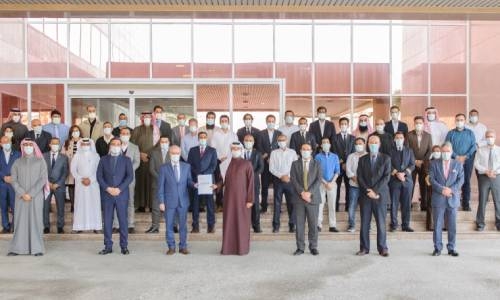Gulf Air successfully accomplishes business continuity management drill test 100% remotely
TDT | Manama
The Daily Tribune – www.newsofbahrain.com
For the first time in the national carrier of the Kingdom of Bahrain’s history, Gulf Air has accomplished the longest business continuity drill test exercise seamlessly with no interruption to Gulf Air’s operations.
The exercise was planned for several of Gulf Air’s critical business functions to measure the airline’s recovery individual competencies and readiness to continue operations in the event of unforeseen situations or disasters.
After the successful completion of the drill test, Acting Chief Executive Officer Captain Waleed Al Alawi received the Business Continuity Committee headed by its chairperson and Chief Technical Officer of Gulf Air Mr Jamal Hashim, who submitted the final drill test report.
The airline’s Acting CEO thanked the Business Continuity committee for a job well done and emphasised the importance of technology and digital transformation strategy for the airline’s business.
The exercise was conducted on the actual airline operations last month by adopting the ‘Work Remotely’ model for three days.
The recovery teams assumed full control of operations, took over from the headquarter team for continuous three days, and performed all the operational activities remotely including communication with live aircraft and global outstations.
Several major business functions were involved in this exercise, such as Integrated Operations Centre (IOC), aircraft Maintenance Control Centre (MCC), Aircraft Technical Planning, Crew Control, the Contact Centre, Flight Dispatch, Central Reservation Centre, Airport Support Unit (ASU), Finance, Revenue Accounting, Human Resources (HR) and Information Technology (IT) and Corporate Communication department (PR).
The exercise was successfully achieved by introducing the latest state-of-the-art high-technology remote collaborative communication solution and telephony softphone workplace for communication and instant decision-making.
The main objective of this exercise was to assess if the predetermined Recovery Time Objective (RTO – time window taken to resume the operations) of business functions are met and to assess recovery plan procedures and team members’ readiness for major incidents, as well as the effectiveness of remote operations.
A business continuity management system (BCMS) is defined as the advanced planning and preparation of an organization to maintain business functions or quickly resume work in/after the event of a major disaster has occurred.
It also involves defining potential risks including natural disasters, fires, flood or cyber-attacks, pandemics, etc.
Related Posts

